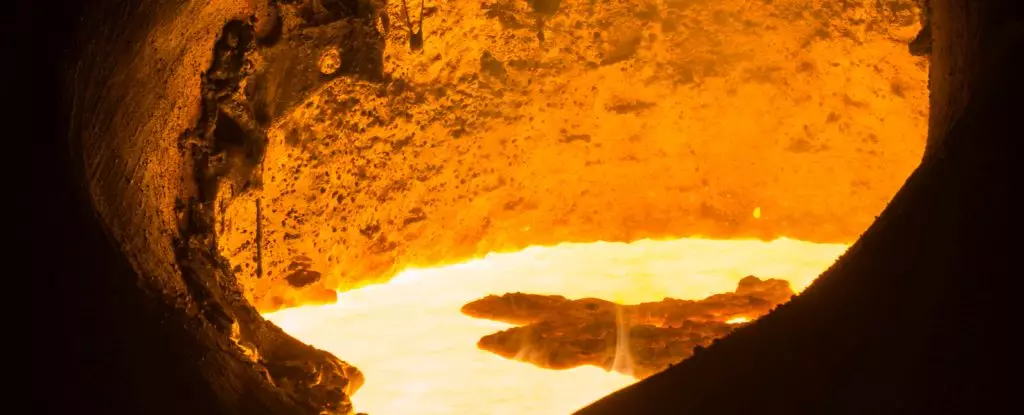Recent revelations about Earth’s geological foundation have turned the scientific world on its head, unveiling a stunning reality — a significant portion of the planet’s gold is found deep within its core. Much like discovering an immense treasure trove buried in your backyard, these findings, though not leading to immediate riches, open a new chapter in our understanding of planetary science. Researchers from Göttingen University in Germany, led by Nils Messling, have documented that gold and other valuable metals are slowly leaking from the core into the mantle and eventually making their way to the crust, the layer we inhabit. The implication is profound: Earth is hoarding a treasure we have barely begun to comprehend, with estimates suggesting that over 99 percent of our planet’s gold remains sequestered in its metallic heart, enough to cover all land with a 20-inch layer. Yet, much like the dragon guarding its gold, this precious resource is not easily accessible.
Gold’s Long Journey: From Core to Crust
How does gold, a symbol of wealth and prosperity, migrate from the fiery depths of the Earth’s core to the comparatively cooler crust? This intricate journey is powered by convecting magma—a dynamic process that transports elements through the various layers of our planet. It is an artistry of geological mechanics, echoing the romanticism of gold rushes of yesteryears, but marked by an insatiable thirst for knowledge rather than mere material gain. The metaphor of gold as a dragon, hoarding its treasure, captures the essence of our planet’s core: a place brimming with potential untapped wealth, constrained by the challenges of extraction that governance and environmental concerns bring to the fore.
The Role of Isotopes: A Window into Earth’s Secrets
The groundbreaking discovery primarily hinges on a detailed analysis of isotopes, specifically ruthenium—the heavy metal cousin of gold. Isotopes act as nature’s fingerprint, providing essential clues about the origin of elements found on the surface. The researchers innovated new methods to detect subtle differences in ruthenium isotopes from volcanic rock in Hawaii, revealing that a notable ratio had originated from the core. This innovative technique not only illuminates the path of metals’ ascent from the core but also straddles the line between science and poetry—a narrative where isotopes tell stories of Earth’s ancient past as well as its future potential.
This poses philosophical questions about our understanding of wealth and resources on a planetary scale. The notion that heavy metals such as gold, palladium, and platinum are trapped in a geological vault raises issues of equity. Who benefits from these resources? Should we continue to explore and extract from Earth’s crust more recklessly, enabling greater consumption, or should we find sustainable ways to responsibly utilize what we have?
A Broader Implication: The Message for Planetary Science
Messling and his team’s work signifies a fundamental shift in our perception of planetary evolution. If Earth’s core is continuously leaking precious materials, could other rocky planets in our solar system—or beyond—harbor similar wealth? What may once have seemed like an isolated geological narrative is now a far more connected and dynamic story. The gossip of wealth leaking from planetary cores could revolutionize our quest for understanding life beyond Earth, fluctuating the paradigms of extraterrestrial treasure hunting.
Yet, as this new knowledge permeates the scientific community, it provokes deeper questions: How ethically should humanity approach the tantalizing prospect of otherworldly mining? In an age of environmental awareness and conservation, this dilemma poses significant moral implications. Potential mining missions to other planets may raise the specter of extractive colonialism in a universe we have only begun to explore.
The discoveries of Earth’s geological processes are more than mere academic curiosities; they are a reflection of humanity’s relentless quest for knowledge and the complexities of our interactions with the planet. As scientists delve deeper into the fundamental secrets of Earth’s creation and the pathways of its riches, we confront a progressively intricate web of questions about equity, sustainability, and our collective future. Rather than treating Earth as a mindful bank for extraction, we might want to consider its wellspring of resources as part of a larger, living system—one that necessitates respect, understanding, and a balanced approach moving forward. This shift in perception could very well redefine our relationship with Earth and the universe at large, transforming the quest for knowledge into a harmonious dialogue with nature itself.


Leave a Reply